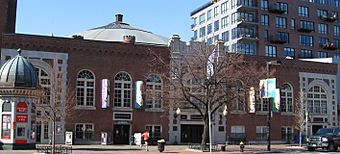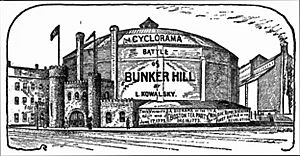Cyclorama Building facts for kids
|
Cyclorama Building
|
|
|
U.S. Historic district
Contributing property |
|
 |
|
| Location | 543-547 Tremont Street, Boston, Massachusetts |
|---|---|
| Built | 1884 |
| Architect | Cummings and Sears |
| Architectural style | Classical Revival, Late Victorian |
| Part of | South End District (ID73000324) |
| NRHP reference No. | 73000318 |
Quick facts for kids Significant dates |
|
| Added to NRHP | April 13, 1973 |
| Designated CP | May 8, 1973 |
The Cyclorama Building is a historic building in the South End of Boston, Massachusetts. It was built in 1884. Today, the Boston Center for the Arts uses this unique building.
Contents
History of the Cyclorama Building
A Home for Giant Paintings
The Cyclorama Building was designed in a Classical Revival and Victorian style. It was built for the Boston Cyclorama Company. Its main purpose was to display huge, circular paintings called "cycloramas." These paintings wrapped all around the viewers.
One famous painting shown here was the Cyclorama of the Battle of Gettysburg. This painting was 400 feet long and 50 feet tall! It showed a scene from the Battle of Gettysburg.
The building was designed by Charles Amos Cummings and Willard T. Sears. It has a huge steel-domed central space. This dome is 127 feet wide. When it was built, it was the second largest dome in the United States. Only the United States Capitol building had a larger dome.
Visitors would enter through an archway. They would then walk along a dark path. After that, they would climb a winding staircase. This led them to a high viewing platform. From there, they could see the entire circular painting. Skylights let in natural light during the day. At night, 25 special lamps lit up the scene.
From Art to Entertainment
By 1889, a new cyclorama painting was installed. It was called Custer's Last Fight. But by 1890, cycloramas were no longer popular. The building got a new owner, John Gardner. He was the father-in-law of Isabella Stewart Gardner.
John Gardner changed the building into a place for fun. It hosted many popular events. People could enjoy a carousel and roller skating. There were also boxing tournaments. Famous boxer John L. Sullivan even fought there in 1894. Other activities included horseback riding and bicycling.
An Industrial Space
By 1899, the building's use changed again. It became an industrial space. Different companies used it for their businesses. These included the New England Electric Vehicle Company and the Tremont Garage. The Buick Automobile Agency also used the building.
The Albert Champion Company was another user. Albert Champion is believed to have invented the spark plug here. He later moved his business to Flint, Michigan.
In 1923, the Boston Flower Exchange bought the building. They added a new entrance. They also covered the central dome with a skylight. The Flower Exchange used the building until 1970.
Boston Center for the Arts
In 1970, the Boston Redevelopment Authority chose the Boston Center for the Arts. They became the new developers for the Cyclorama and nearby buildings.
The Cyclorama Building was added to the National Register of Historic Places in 1973. This means it is recognized as an important historic site. Today, the Boston Center for the Arts uses the building for many cultural events.
Other Cycloramas
The Bunker Hill Cyclorama
Another cyclorama building was built close by. It was only two blocks away from the first one. This competing building displayed a cyclorama of The Battle of Bunker Hill.
 | Delilah Pierce |
 | Gordon Parks |
 | Augusta Savage |
 | Charles Ethan Porter |




